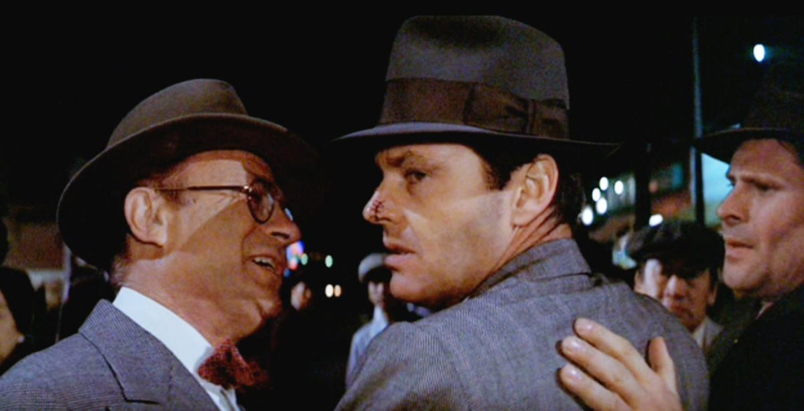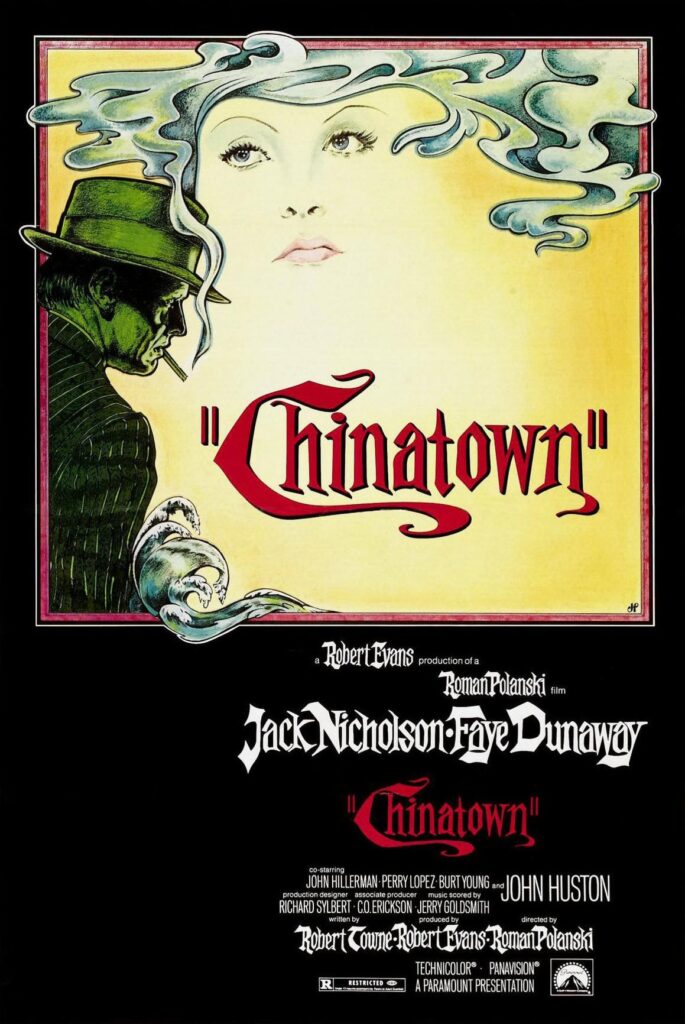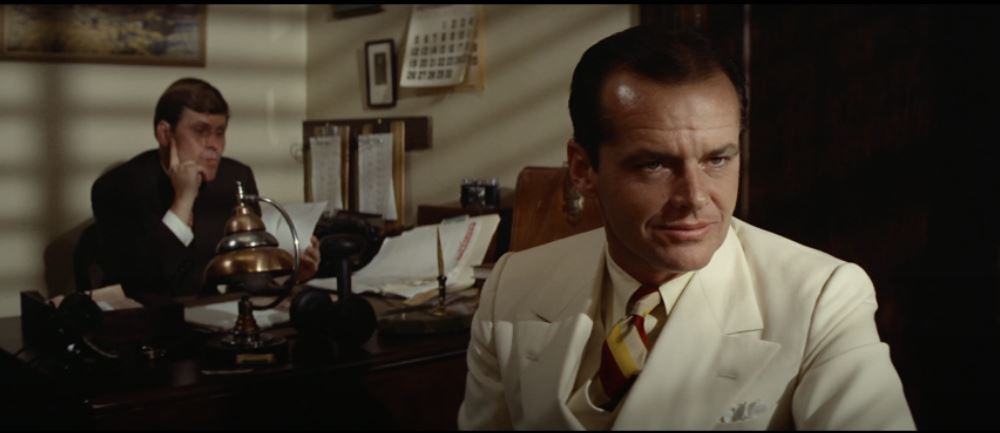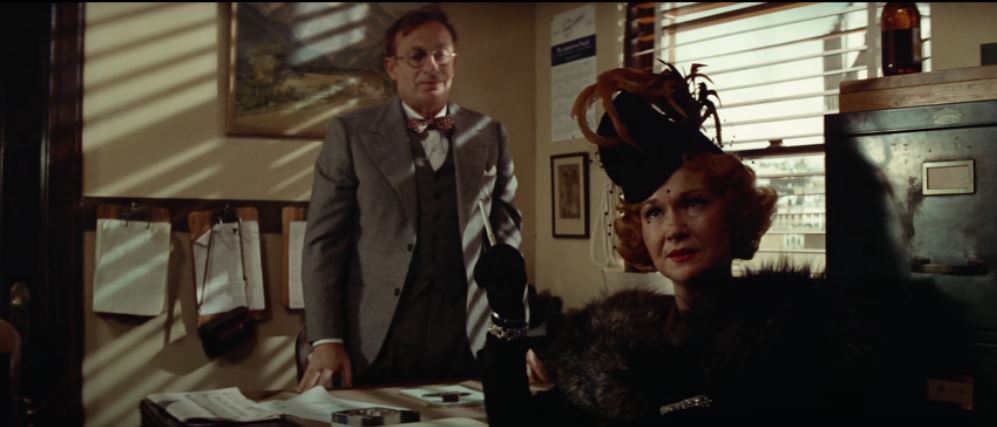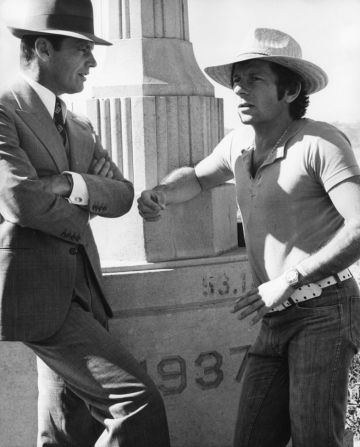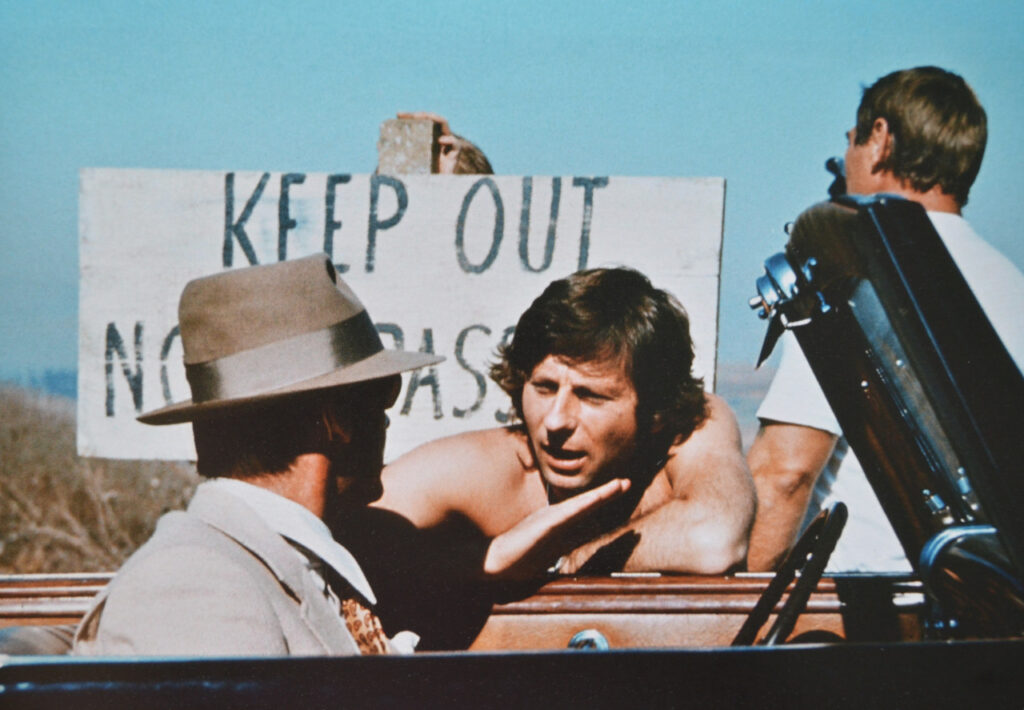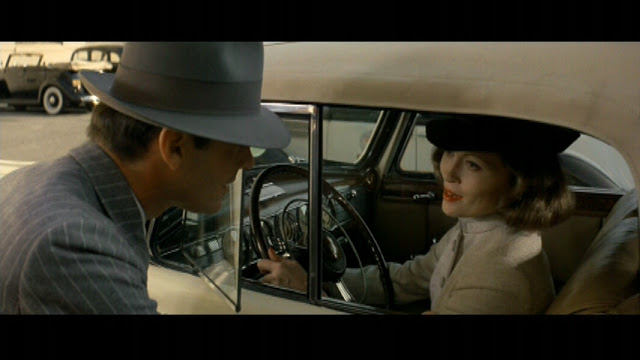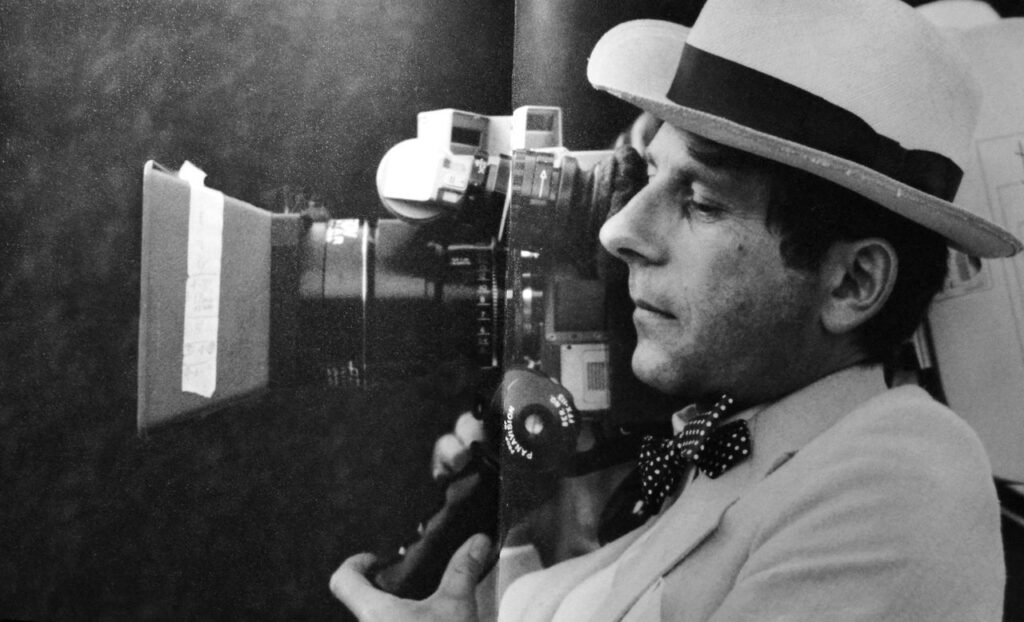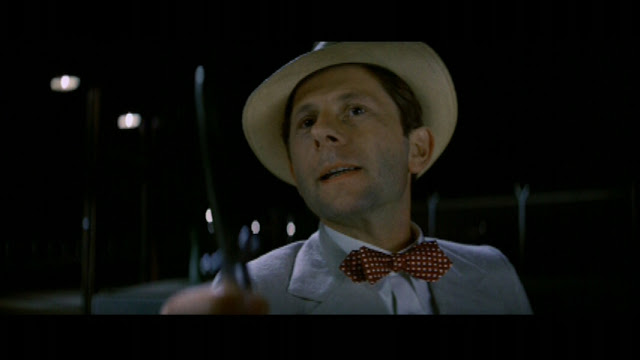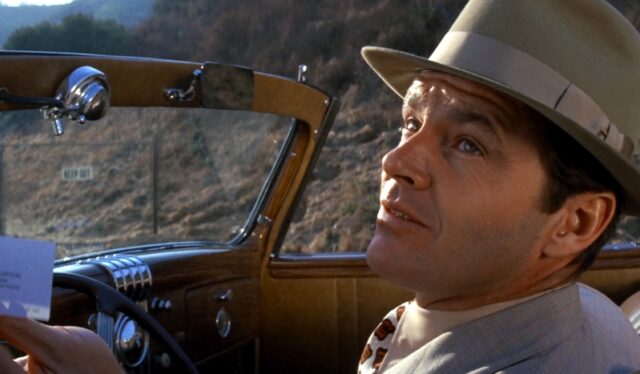
Part of the American New Wave Series
Chinatown (1974) is easily one of the five best films of the American New Wave.
There’s something very special about a movie that makes you want to watch it over and over so you can find more depth to the story. It captures your interest and never lets it go. There is so much going on in Chinatown that each new viewing reveals more and more.
Reviewing Chinatown
I’m taking a different approach to reviewing Chinatown than I did last week when I reviewed The Graduate. It was one thing to give away many of the plot points
and content to enhance the viewers appreciation for a movie without a lot of mystery, but to do that with a film so intricately interwoven with it is a crime and would spoil the entire experience of figuring things out for yourself. So, no major spoilers this week.
One of the finest screenplays in history
Robert Towne’s screenplay is often cited as a primary example of how to craft an intricate screenplay. It starts out very simply. A woman seeks out a private detective to verify that her husband is having an affair.
The first act progresses fairly straightforwardly. Slowly, Jake Gittes, played by Jack Nicholson, unravels the case and brings it to an expected conclusion. There’s just a bit of intrigue along the way that plays into the mystery that follows. Hollis Mulwray, the suspect and head of the city water department, keeps visiting various sites that all have water in common.
When the first act ends and we find out that things are most definitely not how they seemed, the audience has received just enough intrigue to pull them along with Jake into the story. Jake has been had, and one way or another he’s going to find out what’s going on.
Two very finely crafted hours follow which are full of mystery and seemingly disparate story elements. One of the great things about the screenplay is that Jake is unravelling these while putting them together at the same time. The audience is drawn into the story and wants to find out “what’s going on” just as much as Jake does. The result is an enthralling experience. You will never be as engaged with any film mystery than you will be with Chinatown.
Roman Polanski directs Chinatown
Polanski makes a highly credible and engaging movie about deceit. Deception defines nearly every character in the story. It’s about how lies and misrepresenting the truth will ultimately bring someone down, sometimes to tragic proportions. Deceit harms everything and every character in the film practices deception and are also its victim at some point. The end of the movie leaves you with a profound sense about the consequences of lies and deceit.
Everything in a movie can not come from its screenplay alone. So, Polanski filled the movie with visuals by using edits, framing and incorporating little touches drawn from other parts of the story.

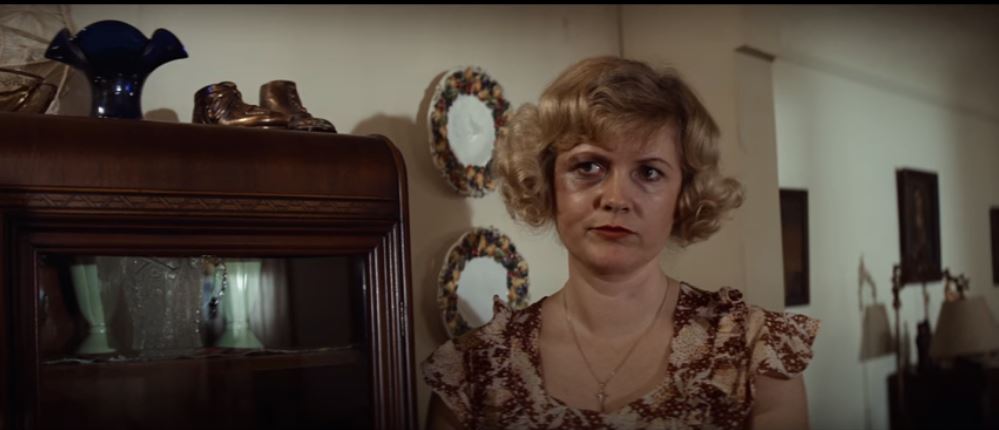
The movie opens with Jake showing explicit photos to a client of his wife having an affair. Near the end of the movie, as Jake needs to escape from the Police to buy time, he comes to this client’s house. We see that the wife now has a black eye.
There are many of these throughout the entire move involving things a simple as a missing shoe. Touches can also give the audience a clue
Jake asks Evelyn Mulwray what the initial C means on a letterhead and learns that it stands for her maiden name, Cross.
Later, in the water office, Jake is in the reception area waiting to see the director. He looks at the photos and there are several which read Noah Cross.


It’s through subtlety like this that Polanski allows the audience to fully engage in the movie. Polanski makes the audience feel smart because they figure things out before Jake does, and there are also many of these in the movie.
Neo Noir
Film noir ended in the late 50s. Critics and artists agree that Neo Noir emerged from its ashes. Neo Noir differentiates itself in a number of ways. They’re in color. Instead of high contrast, where there is deep darkness and brightness, Neo Noir uses light and shadow and the stakes tend to be bigger than the petty criminals in Film Noir. The lines between good and bad are much more ambiguous. The endings can also have more ambiguous results–“has Justice really been served?” In other ways the two are similar and we see that in Chinatown.
A detective at the center of the story who is morally ambiguous but also has a high sense of Justice. A Femme Fatale for sure, but a mix of Mary Astor in The Maltese Falcon and the physical allure of a traditional Femme.
But Chinatown fits squarely into the Neo Noir category, matching all of the characteristics exactly. Some other Neo Noirs from the New Wave you might want to check out are Body Heat, All the President’s Men, Badlands and The Conversation.
Ending Line
There is no way I’m spoiling the movie by telling you the ending. But I will mention that Chinatown has one of the most often quoted and parodied ending lines in all the movies.
The story has played itself out. We have our morally ambiguous ending and are wondering if Justice is really served. Jake knows the public story is going to be different from what really happened, and this upsets his strong sense of Justice. His associates begin to walk him away, but Jake turns to look back. His associate stops him and calmly tells him “Forget it Jake, it’s Chinatown.” A place where things go down very differently and it’s hard to make heads or tails out of anything. It’s not so much the place but an idea. The mystery is so jumbled and confusing that no one in the film is going to be able to make sense out of it. Don’t try to protest or act out. Forget it Jake, it’s Chinatown.
Performances
Jack Nicholson as Jake Gittes
Nicholson was given a difficult task. He’s playing a character that could be quite unlikeable. If the audience can’t somehow find a way to like a character they drop out of the story. Jake can be angry and snide, but Towne gives him gems in the story along the way and Nicholson plays them brilliantly. Nicholson always finds the perfect tone for every line and scene in the movie and you never hate him for his transgressions.
In the second scene of the movie where he’s being hired to tail Hollis, he tries to ward off the wife by saying it’s best to “let sleeping dogs lie.” Nicholson brings the perfect tone to it. He’s not mocking her or laughing at her, he plays it completely sincerely and established early on that this isn’t a private detective merely out to make a buck. Later on when he comes to the aid of Evelyn, played by Dunaway, at the police station by backing up her story even though it is a lie, he doesn’t play the big hero, he doesn’t say it like he’s trying to get something out of it, he just plays it low key and natural. Just a matter of fact, and the audience loves him for it.
Faye Dunaway as Evelyn Mulwray
Evelyn Mulwray holds the key to the most important part of the mystery. The keeper of the secret. While John Huston knows it too, all the information flows through Evelyn to Jake because she is the closest to him. Dunaway always finds the perfect, subtle way of reacting any time Jake asks her something that she doesn’t want to reveal. A slight change of facial expression, a brief crack in the voice, and moving an arm to cover herself are just some of the barely perceivable choices Dunaway makes to subliminally convey that to the audience.
Like Nicholson, she never has a single moment where something is either under acted or over acted. Rather, she brings a unique blend of determination, cunning and vulnerability to Evelyn. Everything that Dunaway brought to the part pays off near the end of the movie when Jake finally worms “the terrible secret” out of her. It’s devastating for the audience to hear and see because everything about the two performances is played so perfectly.
John Huston as Noah Cross
Noah Cross is an unlikable character. He is the principle villain of the story after all. But despite this, John Huston refrains from making him overly sinister or ghoulish. He’s a realistic bad guy. Evelyn warns Jake that her father is dangerous. Noah isn’t overtly dangerous though. Yet the audience perceives this anyway through Huston’s performance. The audience senses that Cross is confident and determined and has a firm belief system. He doesn’t equivocate his opinions, he states them. Huston telegraphs all of this to the audience with his performance. The performance makes the audience feel smart. Noah also delivers the line that firmly tells the audience exactly what both he and Evelyn want. “Just find the girl” drives everything he and Evelyn do.
Legacy
Chinatown was nominated for eleven Academy Awards including Best Picture, Best Actor, Best Actress, Best Cinematography, Editing, Costumes, Art Direction, Score and Sound. Robert Towne won for his screenplay. The screenplay has gone down as one of the very best. It won the Golden Globe for Best Picture Drama, Director and Screenplay. It made $29.2 million from a budget of $6 million.
I could go on and on about Chinatown. In writing this review, I was taking notes every couple of minuets, sometimes in less time. After an hour and 45 minutes watching I had only seen 53 minutes of the actual film. It took me that much again to finish it.
If you see the movie you’re going to want to see it again. You’re going to want to own a copy so you can pick it apart again and again. I get more out of it each time I watch it, and that’s the fun of it. It’s what keeps you coming back again for more. You’ll never get tired of Chinatown.
